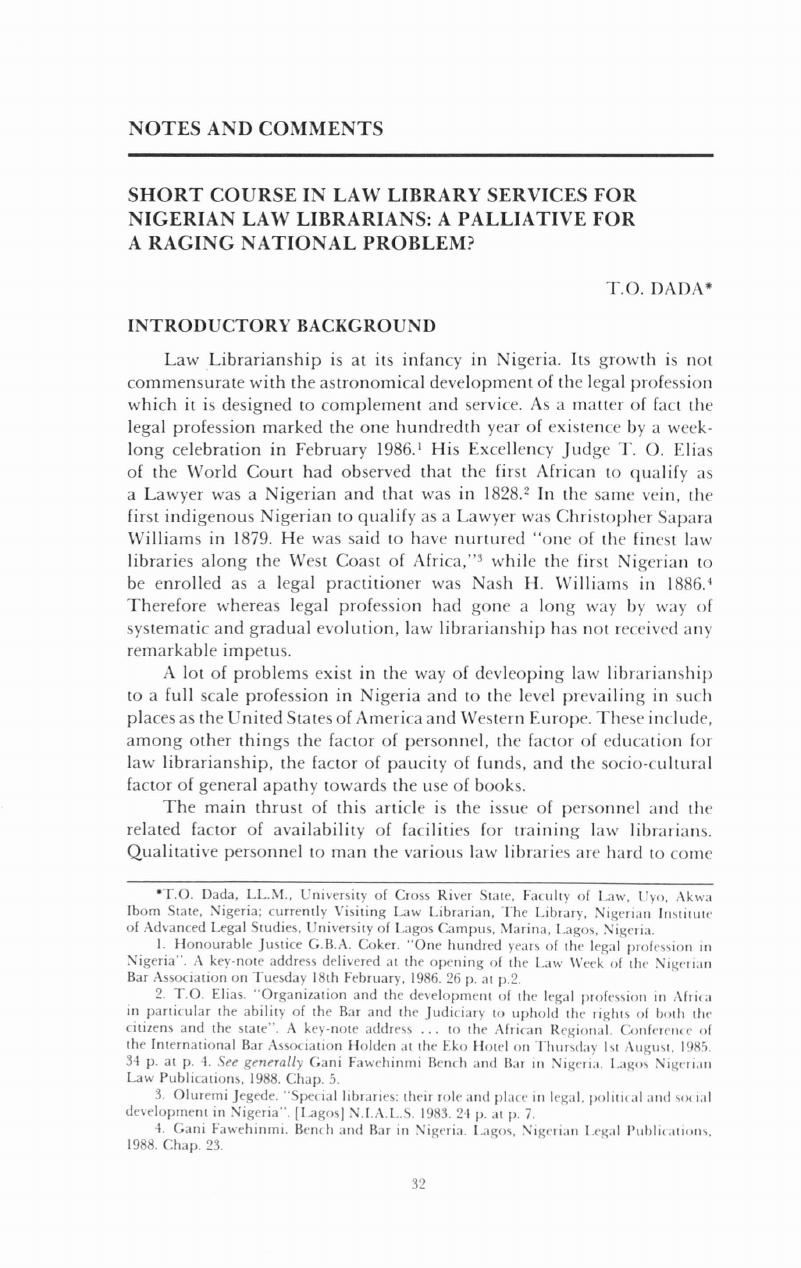No CrossRef data available.
Article contents
Short Course in Law Library Services for Nigerian Law Librarians: A Palliative for a Raging National Problem?
Published online by Cambridge University Press: 28 February 2019
Abstract

- Type
- Notes and Comments
- Information
- Copyright
- Copyright © 1989 by The Institute for International Legal Information
References
1. Honourable Justice G.B.A. Coker. “One hundred years of the legal profession in Nigeria”. A key-note address delivered at the opening of the Law Week of the Nigerian Bar Association on Tuesday 18th February, 1986. 26 p. at p.2.Google Scholar
2. T.O. Elias. “Organization and the development of the legal profession in Africa in particular the ability of the Bar and the Judiciary to uphold the rights of both the citizens and the state”. A key-note address … to the African Regional. Conference of the International Bar Association Holden at the Eko Hotel on Thursday 1st August, 1985. 34 p. at p. 4. See generally Gani Fawehinmi Bench and Bar in Nigeria. Lagos Nigerian Law Publications, 1988. Chap. 5.Google Scholar
3. Oluremi Jegede. “Special libraries: their role and place in legal, political and social development in Nigeria”. [Lagos] N.I.A.L.S. 1983. 24 p. at p. 7.Google Scholar
4. Gani Fawehinmi. Bench and Bar in Nigeria. Lagos, Nigerian Legal Publications, 1988. Chap. 23.Google Scholar
5. Nigerian Institute of Advanced Legal Studies Decree 1981. No. 18 of 1984. Section 4(c).Google Scholar
6. Nigerian Institute of Advanced Legal Studies, Short course in Law Library Services. Programme p. 2.Google Scholar
7. The “Law Librarian” of the stuff being hereby mooted may not necessarily be a qualified lawyer as such. He should be the type that had undergone a process of education for law librarianship based on a well designed and tested syllabus consisting mainly of masterly blending of law and library science topics. This could go a long way lo solving the current impasse.Google Scholar
8. FEM is the acronym for the Foreign Exchange Market while SFEM stands for the Second Foreign Exchange Market. These fiscal measures were introduced by the Federal Military Government to regulate and control the value of the Nigerian money and the economy in general which hitherto had shown advanced traces of strains and stresses in relation to the Dollar and Sterling and devaluation had set in. The various monetary policies and control devices were introduced by the “Second-Tier Foreign Exchange Market Decree 1986 No. 23 of 1986”.Google Scholar
9. This would be in tune with the resounding success that characterized the participation of some American Scholar Law-Librarians in the seminar organized by the Nigerian Association of Law Libraries in 1981 at the Nigerian Law School, Lagos. Such eminent Law Librarians as Professor Julius Marke, Professor Ervin Surrency, and Mr. Philip Cohen, the President of the New York based Oceana Publications, delivered papers and led discussions at the seminar. Some British experts in the law book trade as represented by the Sweet and Maxwell also took part in the seminar. The changing economic and fiscal conditions notwithstanding, there seems to be every cause to be optimistic that such bodies as the United States Information Service (USIS), the British Council and some reputable Law Book Publishers and renown academic and research law libraries overseas could assist in making the right calibre of resource personnel available.Google Scholar


